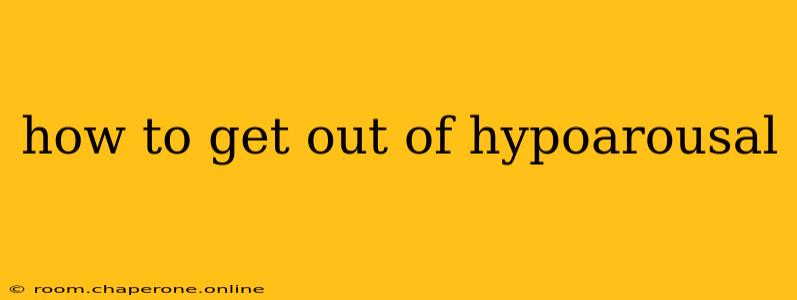Hypoarousal, a state characterized by low energy, reduced motivation, and blunted emotional responses, can significantly impact daily life. It's not simply feeling tired; it's a deeper, pervasive lack of activation that affects both physical and mental functioning. Understanding its causes and implementing effective coping strategies is crucial for regaining vitality and well-being. This guide explores practical steps to help you navigate hypoarousal and reclaim your energy.
Understanding Hypoarousal: What It Is and What Causes It
Hypoarousal isn't a clinical diagnosis in itself, but rather a collection of symptoms that can be associated with various underlying conditions. It's often linked to:
- Depression: A common characteristic of depression is a persistent low mood, alongside reduced energy levels and diminished interest in activities once enjoyed.
- Trauma: Experiences of trauma can lead to a state of emotional numbing and reduced responsiveness, a form of hypoarousal as a coping mechanism.
- Burnout: Chronic stress and exhaustion can deplete energy reserves, resulting in a state of low arousal.
- Medication side effects: Certain medications can cause fatigue and reduced energy as side effects.
- Medical conditions: Underlying health issues like thyroid problems, sleep disorders, or vitamin deficiencies can contribute to hypoarousal.
Strategies to Combat Hypoarousal: Reclaiming Your Energy
Getting out of hypoarousal requires a multifaceted approach. It's not a quick fix but a process that involves self-awareness, lifestyle adjustments, and potentially professional help.
1. Lifestyle Changes: The Foundation of Recovery
- Prioritize Sleep: Aim for 7-9 hours of quality sleep nightly. Establish a consistent sleep schedule and create a relaxing bedtime routine.
- Regular Exercise: Even moderate physical activity can significantly boost energy levels. Start small and gradually increase intensity and duration. Focus on activities you enjoy to enhance adherence.
- Nourishing Diet: A balanced diet rich in fruits, vegetables, and whole grains provides sustained energy and essential nutrients. Limit processed foods, sugar, and caffeine.
- Hydration: Dehydration can exacerbate fatigue. Drink plenty of water throughout the day.
- Mindfulness and Meditation: Practicing mindfulness can increase self-awareness and help manage stress, a common contributor to hypoarousal. Regular meditation can promote relaxation and improve energy levels.
- Sunlight Exposure: Sunlight helps regulate your circadian rhythm and boosts vitamin D levels, contributing to improved mood and energy. Aim for at least 15 minutes of sunlight daily.
2. Addressing Underlying Conditions: Seeking Professional Help
If lifestyle changes alone don't provide sufficient relief, it's crucial to consult a healthcare professional. They can assess for underlying medical or psychological conditions contributing to your hypoarousal. This might involve:
- Medical Evaluation: Rule out any physical health issues through blood tests, screenings, and other assessments.
- Therapy: Cognitive Behavioral Therapy (CBT) and other therapeutic approaches can help address emotional regulation, trauma processing, and stress management.
- Medication: In some cases, medication may be necessary to treat underlying conditions like depression or anxiety, which frequently accompany hypoarousal.
3. Gradual Activation: Building Momentum
Avoid overwhelming yourself with drastic changes. Start with small, manageable steps to gradually increase your activity levels and engagement with life.
- Set Realistic Goals: Break down larger tasks into smaller, achievable steps. Celebrate your successes to maintain motivation.
- Engage in Enjoyable Activities: Focus on activities you find stimulating and rewarding, even if initially only for short periods.
- Social Connection: Spend time with supportive friends and family. Social interaction can boost mood and energy.
Conclusion: A Path to Revitalization
Hypoarousal can feel debilitating, but it's a challenge that can be overcome with a combination of self-care, lifestyle adjustments, and professional support when needed. By understanding the potential causes, implementing effective strategies, and seeking help when necessary, you can reclaim your energy and vitality, paving the way for a more fulfilling life. Remember that recovery is a journey, not a destination, and progress takes time and patience. Be kind to yourself throughout the process.

